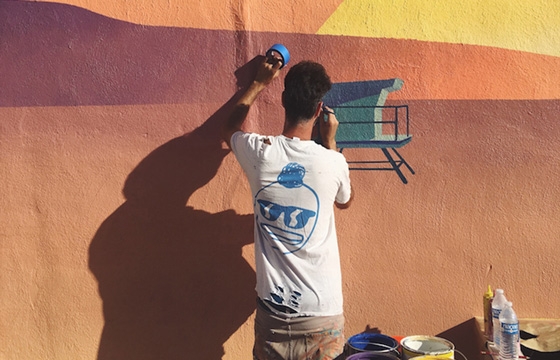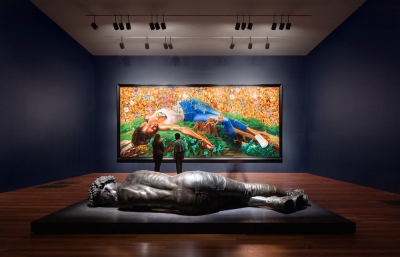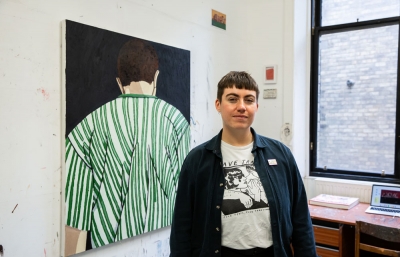Maxwell McMaster
Golden State of Mind
Interview by Evan Pricco Portrait by Christina Villamore
California. As an inspiration, it is a cornucopia of colors. A palette of emerald from the north coast would dramatically differ from pale pastels of the deserts in the extreme Southeast. From Eureka to San Diego, it's a massive state, an amalgamation of the entire planet in one 840-mile stretch, north to south. Maxwell McMaster, a native of Central California, now based in Los Angeles, captures a particular mood and aesthetic of the romanticism of the Golden State. With sunset hues and coastal vantage points, McMaster taps into a subconscious and flat, dreamy depiction of home and place, one that doesn't necessarily make him a pastoral or environmental artist, but someone who channels space in unique ways.
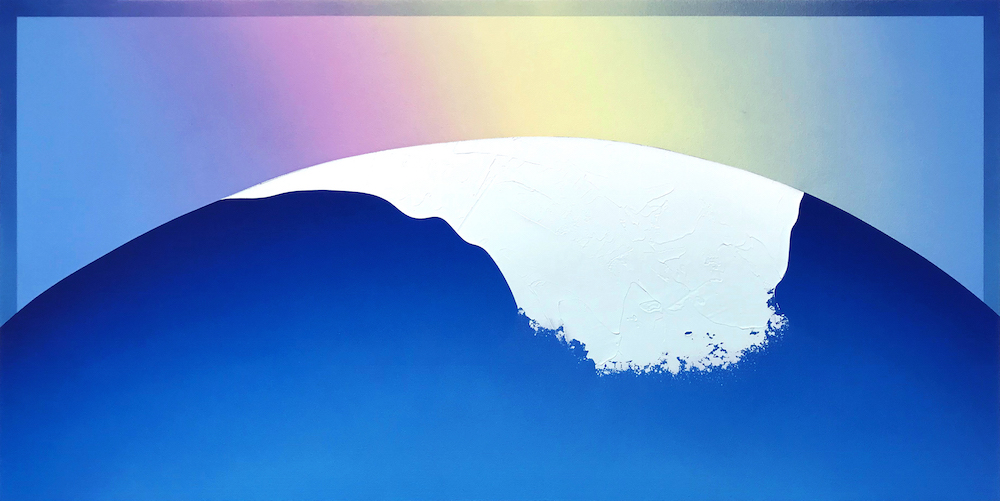
Evan Pricco: Let's kick this off with the folksy part of your work: do you prefer sunrises or sunsets?
Maxwell McMaster: I'm into sunrises right now, since I don't see them as often. They're more rare for me. So maybe I don't know as much about them, they’re not so familiar. There’s also something about the idea of new beginnings that I like. However, I typically paint sunsets. I love the colors and observing how they change with time and the seasons.
You grew up in Sacramento, right? I always think of Central California as a hotbed of creative talent. So much has come from there. Did you feel that growing up?
Yeah, Sacramento. It starts with my Dad and music: growing up with a dad who's a musician and listening to music from the 1960s and '70s. What I didn't know at the time was about the hippie movement in the Bay and Los Angeles. My parents grew up a little after that wave, but it was still present. Growing up with that music and culture in my house that was a huge influence.
My Dad also encouraged me to draw. I remember him sitting me in front of the TV to draw from a show called Secret City on PBS. I think I still have the book around somewhere. I must've been about eight or ten years old.
I really looked up to my older cousin, Loren, and I started skateboarding when I was about 12. At some point, he gave me his old deck. I think I got the other parts from a toy board and added bearings. It was super budget, but I was proud of it. That was the beginning of me learning about a lot of things, including hip hop. I think that was very much a generational thing. My parents didn't like it, so maybe that's why I was so curious. In junior high, hip hop was everything. Breakdancing was huge at my school. Graffiti was the art part of that culture, and I gravitated naturally to it.
There were also the trains. I remember riding the trains from San Jose to Sacramento and seeing graffiti along the train tracks. I was blown away because I had never seen anything like it in real life. I think it was happening in Oakland and I felt inspired to figure out what it was about. I knew a little already, but had no idea about how widespread; how many people were actually out there doing the stuff. It was the art aspect I was most attracted to... why this art was put here, out of nowhere. The style, colors and the mystery were very alluring, and from there, it became an obsession. In hindsight, I don't really know exactly why I liked it so much. I already liked art, but this was my generation's version, or at least that's how I felt, and I wanted to be all about it.
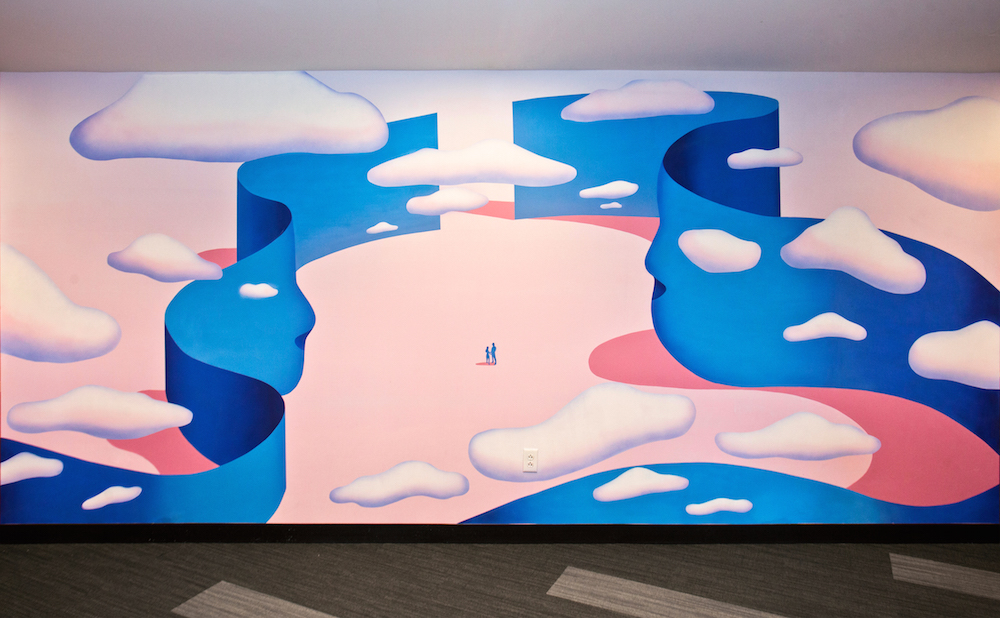
When I saw your show in 2018 at Public Land in Sacramento, I thought, "Okay, this is someone talking about the natural environment and climate change in an interesting way." You weren't, like, hammering us all over the head with concept, but it felt like an authentic ode to our world. What do you think when someone says that you are an environmental artist? Is this something new?
I don't consider myself to be an environmental artist. I do connect with nature and I like to make work about something so inspirational. Especially later in life, living in L.A., my appreciation for the outdoors has grown since I have less time to get out and be in it.
That said, if my work inspires others to care for and appreciate the environment, I'm all for that. It's essential to our existence and vital to our survival, and necessary to preserve. If I could make someone take a second look and recognize the value, then I think that's awesome.
How much does just the setting of California play into your work?
Specifically, Los Angeles, where I currently live, inspires my color palettes. I've wandered around much of California over the years, so it comes out in the work for sure. In the end, though, the scenes are mostly imagined.
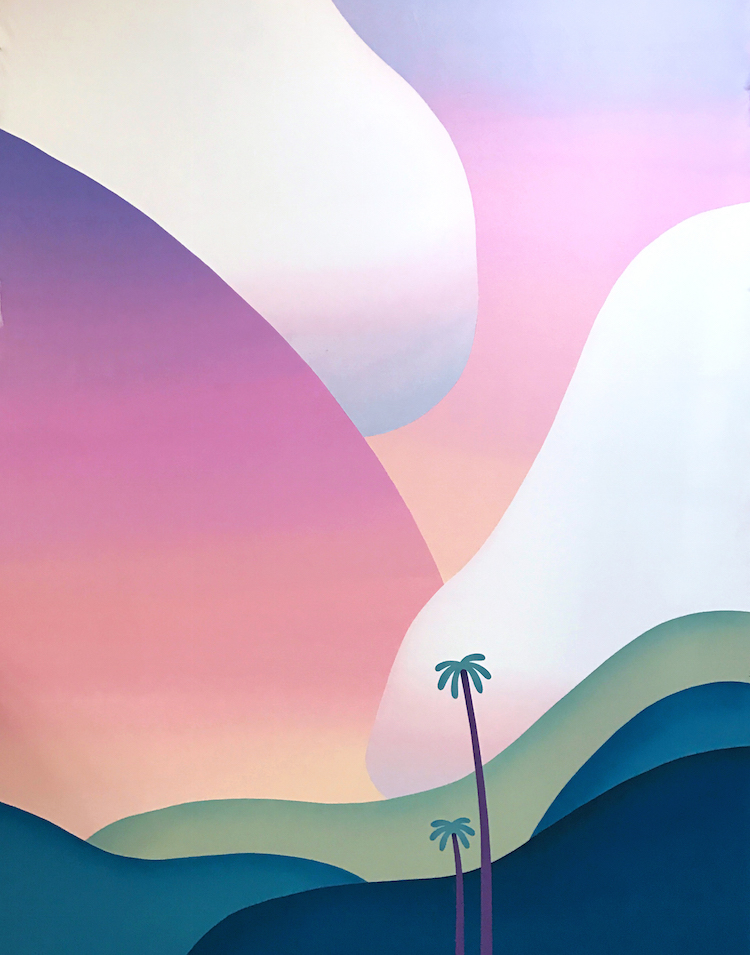
When Juxtapoz approached you a few months back, prior to your show at First Amendment, we talked about some surrealistic qualities to the work. What's interesting to me is that you have these natural-world-meets-surreal-video-game scenes. It feels like you are balancing a bunch of interests and inspirations. What sort of things inspire you?
It's interesting you bring up video games. I see what you mean. If they're an influence, it's totally subconscious. I sat in front of a console for hours on end as a kid. I had a Sega Master System. I remember a game called Hang On, and I would also borrow my friends Super Nintendo, so maybe some Zelda and Super Mario Kart were in there, too.
I have to go back to music, though. Musicians, their aesthetics, their visual languages, and fashion are all things that supply endless inspiration. And for me, it's namely pop, jazz, soul, R&B, hip hop, and reggae acts.
I'm also just inspired by the artwork of others, my peers and past masters. When I'm in the presence of art that feels visceral, it's a quality I want to recreate. It doesn't have to be something obvious. It may be a surface, a texture, a color combination. To get a sense of something really alluring about a piece and anything that makes me feel something deeper invites me to return and investigate what it's really about. For me, that timeless quality is the magic of art.
Did you have art heroes growing up?
Early on, it was M.C.Escher, then later, Dalí. After, it was graffiti artists like Barry McGee and Mike Giant, but there are really too many to mention.
Where you went to school, Art Center College in Pasadena has these mega alumni: Ryden, Clayton Brothers, Doug Aitken and Jeff Soto, just to name a few. How was studying there?
When I first moved to L.A., I didn't really know of the school. My ex-girlfriend told me about it. I didn't consider art as a career until I moved here. The few artists that I did know had either gone to Cal Arts or Art Center. When I went to check out the school, I was super impressed by the student work. I wasn't aware of the Art Center's legacy or alumni, I just wanted to learn what those students were learning. It was a transformative experience and I feel fortunate to have studied under the amazing artists and designers who teach there.

You've dabbled a bit in muralism and installation art, which especially compliments the paintings so well in situ. Do you like working on different scales like that?
When I'm working on a mural, that particular situation makes me think a lot more about the viewer. Is it a gallery, a restaurant, a street? How will it be viewed and from what distance? I enjoy working on murals because it's an application of an artwork that activates a space. A mural serves a slightly different purpose, and a lot of mine serve as a backdrop to enhance the experience of a space. I enjoy mining that connection.
As for installations, I'm really having a lot of fun. It's freeing not to be limited to a canvas. I'm not tied to one medium, and it opens up the possibilities for creating anything I want. To be honest, I'm most excited about this new direction. I like being able to create without the pressure of selling. It's a bonus, an excuse to push my work. It's created to be experienced, and that's it.
In your past work and some shows you have had, I noticed this almost perfection in the work; it felt almost digital. In Natural High, you got a little.... loose? A little intentional in almost breaking your rules. What pushed you into that direction?
One of the most important things for me is to evolve. I constantly get caught in the battle between what works or staying in the safe zone, but I get most excited and satisfied when I make something fresh.
The exploration is the fun. It keeps me making art. My process can weigh me down at times, and I was looking to create work that felt a little more direct, intuitive, and fun.

I read in a recent interview you did about the Natural High show that the works you make might be a reaction to your own melancholy. What is your reaction to know that so many people are expressing this sort of love and optimism when they see your work? I understand that is the intention, but does it still strike you as a fascinating extension to your process?
Yeah, totally. I think it's awesome to leave someone with a good feeling. It's too easy to be negative in this world. I think it's more of a challenge to express optimism and hope.
What do you want the viewer to see in your work? What is a reaction that you are seeking from others, or that you may even seek for yourself?
I want people to feel what I feel when I walk into a gallery or museum. Lightness. Almost like a stress release or an escape from reality. Sort of this feeling of, "I'm happy this exists."
What do you have lined up in 2019?
Still sorting it out, but really looking forward to it. I have a couple of shows in the works and an exciting video project. Overall, I just want to keep growing and improving.

